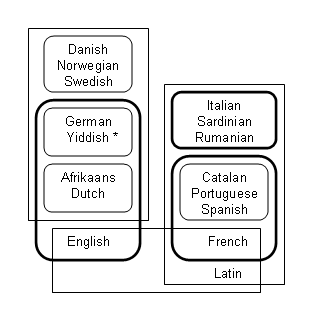Franklin's House Rules for Languages
All original work herein is copyright © by Franklin W. Cain. All rights reserved. (Last updated: 21 September 2006)
General Info I have never liked that Languages were the only Background Skills without associated skill rolls. They've always been "either-or" -- either the hero has the language (and at the necessary level of fluency), or else he doesn't... So, I have written my own version of Language skills, to be used in any campaign I run using the 5th edition of the HERO System. Native Language(s) Each character has one (and only one) native language. This native language costs no points, and has a (base) skill roll of 14, which can be improved by +3 to the skill roll for each +1 point to the cost of the Language skill. For a character to be bilingual, the player must still choose the one (free) native language, and then purchase the second "native language" for the usual price (see below), improving this second language to a skill roll of at least "14-". Degrees of Similarity I will be using a corrected version of the Language Familiarity Chart (page 43) for determining the costs for additional Language skills.
 Errata:
There should be a thin box with square corners
surrounding the Nordic Languages
(Danish, Norwegian, Swedish)
as well as the Germanic Languages
(German, Yiddish, Dutch, and Afrikaans,
but not including English)...
Also,
Hebrew should not
be in the same box
as German and Yiddish.
Instead,
there should be an asterisk on Yiddish
(as per the Errata)...
Here is an image (to the right)
showing these specific corrections.
These corrections have already been included
in my version of the Language Chart.
When determining the difficulty
(i.e., the base skill roll and cost)
of a new language,
use the most advantageous degree of similarity
among all languages already known to the hero
at a native degree of fluency
(i.e., all languages with a skill roll
of "14-"
or better).
"Closely Related" Languages
A language having "four points of similarity"
(as per the Language Familiarity Chart)
with the character's native language
(or other language of similar fluency)
is considered to be closely related
to that language.
Errata:
There should be a thin box with square corners
surrounding the Nordic Languages
(Danish, Norwegian, Swedish)
as well as the Germanic Languages
(German, Yiddish, Dutch, and Afrikaans,
but not including English)...
Also,
Hebrew should not
be in the same box
as German and Yiddish.
Instead,
there should be an asterisk on Yiddish
(as per the Errata)...
Here is an image (to the right)
showing these specific corrections.
These corrections have already been included
in my version of the Language Chart.
When determining the difficulty
(i.e., the base skill roll and cost)
of a new language,
use the most advantageous degree of similarity
among all languages already known to the hero
at a native degree of fluency
(i.e., all languages with a skill roll
of "14-"
or better).
"Closely Related" Languages
A language having "four points of similarity"
(as per the Language Familiarity Chart)
with the character's native language
(or other language of similar fluency)
is considered to be closely related
to that language.
Similarity
and Cost
for Linguist
("8-" for no pts.)
("11-" for no pts.)
("8-" for 1 pt.)
(see below) *
("8-" for 1 pt.)
("8-" for 1 pt.)
All original work herein is copyright © by Franklin W. Cain. All rights reserved. (Last updated: 21 September 2006)